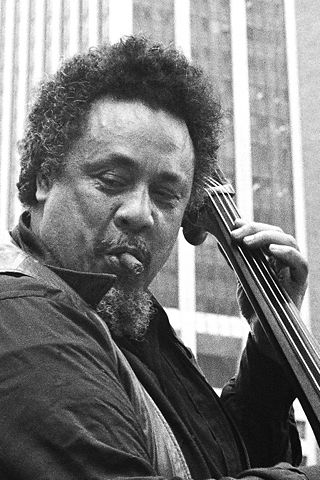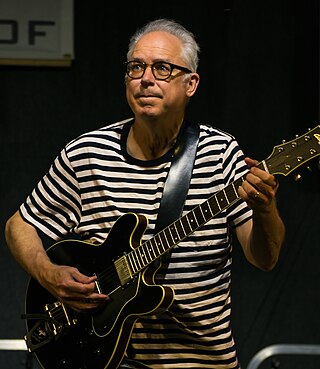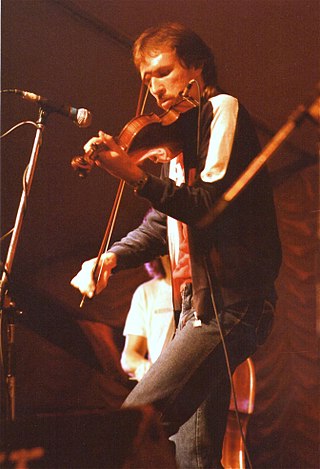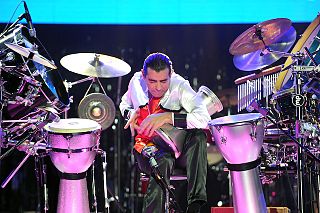
Charles Mingus Jr. was an American jazz upright bassist, composer, bandleader, pianist, and author. A major proponent of collective improvisation, he is considered one of the greatest jazz musicians and composers in history, with a career spanning three decades and collaborations with other jazz greats such as Duke Ellington, Charlie Parker, Max Roach, and Eric Dolphy. Mingus's work ranged from advanced bebop and avant-garde jazz with small and midsize ensembles to pioneering the post-bop style on seminal recordings like Pithecanthropus Erectus (1956) and Mingus Ah Um (1959) and progressive big band experiments such as The Black Saint and the Sinner Lady (1963).

The double bass, also known as the upright bass, the acoustic bass, the bull fiddle, or simply the bass, is the largest and lowest-pitched chordophone in the modern symphony orchestra. It has four or five strings, and its construction is in between that of the gamba and the violin family.

A big band or jazz orchestra is a type of musical ensemble of jazz music that usually consists of ten or more musicians with four sections: saxophones, trumpets, trombones, and a rhythm section. Big bands originated during the early 1910s and dominated jazz in the early 1940s when swing was most popular. The term "big band" is also used to describe a genre of music, although this was not the only style of music played by big bands.

The Boston Symphony Orchestra (BSO) is an American orchestra based in Boston. It is the second-oldest of the five major American symphony orchestras commonly referred to as the "Big Five". Founded by Henry Lee Higginson in 1881, the BSO performs most of its concerts at Boston's Symphony Hall and in the summer performs at Tanglewood.

John Scofield is an American guitarist and composer. His music over a long career has blended jazz, jazz fusion, funk, blues, soul and rock. He first came to mainstream attention as part of the band of Miles Davis; he has toured and recorded with many prominent jazz artists including saxophonists Eddie Harris, Dave Liebman, Joe Henderson, and Joe Lovano; keyboardists George Duke, Joey DeFrancesco, Herbie Hancock, Larry Goldings, and Robert Glasper; fellow guitarists Pat Metheny, John Abercrombie, Pat Martino, and Bill Frisell; bassists Marc Johnson and Jaco Pastorius; and drummers Billy Cobham and Dennis Chambers. Outside the world of jazz, he has collaborated with Phil Lesh, Mavis Staples, John Mayer, Medeski Martin & Wood, and Gov't Mule.

John McLaughlin, also known as Mahavishnu, is an English guitarist, bandleader, and composer. A pioneer of jazz fusion, his music combines elements of jazz with rock, world music, Western classical music, flamenco, and blues. After contributing to several key British groups of the early 1960s, McLaughlin made Extrapolation, his first album as a bandleader, in 1969. He then moved to the U.S., where he played with drummer Tony Williams's group Lifetime and then with Miles Davis on his electric jazz fusion albums In a Silent Way, Bitches Brew, Jack Johnson, Live-Evil, and On the Corner. His 1970s electric band, the Mahavishnu Orchestra, performed a technically virtuosic and complex style of music that fused electric jazz and rock with Indian influences.

William Richard Frisell is an American jazz guitarist. He first came to prominence at ECM Records in the 1980s, as both a session player and a leader. He went on to work in a variety of contexts, notably as a participant in the Downtown Scene in New York City, where he formed a long working relationship with composer and saxophonist John Zorn. He was also a longtime member of veteran drummer Paul Motian's groups from the early 1980s until Motian's death in 2011. Since the late 1990s, Frisell's output as a bandleader has also integrated prominent elements of folk, country, rock ‘n’ roll and Americana. He has six Grammy nominations and one win.

Paul Laurence Dunbar Chambers Jr. was an American jazz double bassist. A fixture of rhythm sections during the 1950s and 1960s, he has become one of the most widely-known jazz bassists of the hard bop era. He was also known for his bowed solos. Chambers recorded about a dozen albums as a leader or co-leader, and over 100 more as a sideman, especially as the anchor of trumpeter Miles Davis's "first great quintet" (1955–63) and with pianist Wynton Kelly (1963–68).

Dianne Elizabeth Reeves is an American jazz singer.
KUVO is a non-profit FM radio station broadcasting mainly jazz music in a public radio format. Licensed to Denver, Colorado, KUVO is owned by Rocky Mountain Public Media Inc. KUVO's mission is to "provide distinctive music, news and informational programming reflecting the values and cultural diversity of their listener community."

Mark O'Connor is an American fiddle player, composer, guitarist, and mandolinist whose music combines bluegrass, country, jazz and classical. A three-time Grammy Award winner, he has won six Country Music Association Musician Of The Year awards and was a member of three influential musical ensembles: the David Grisman Quintet, The Dregs, and Strength in Numbers.

While Denver may not be as recognized for historical musical prominence like such cities as Los Angeles, Detroit, Chicago or New York City, it still manages to have a very active popular, jazz, and classical music scene, which has nurtured many artists and genres to regional, national, and even international attention. Though nearby Boulder, Colorado has its own very distinct music scene, they are intertwined and often artists based there also play in Denver.

Rony Barrak is a Lebanese darbouka player and composer. He began playing the darbouka at four.
Reed Mathis is a bassist, producer, singer, and guitarist who is best known for his 15-year stint as co-leader of the Tulsa progressive jazz band Jacob Fred Jazz Odyssey. The Bay Area rooted player has also notably worked with Grateful Dead members Bob Weir, Phil Lesh, Mickey Hart, Bill Kreutzmann. He played with Steve Kimock Band, and is a former member of Tea Leaf Green.
Karl E. H. Seigfried is a German–American jazz, rock, and classical bassist, guitarist, composer, bandleader, writer and educator based in Chicago.

The Boulder Philharmonic Orchestra, founded in 1958, is a professional symphony orchestra based in Boulder, Colorado. It is led by Music Director Michael Butterman. The Boulder Philharmonic's season at Macky Auditorium on the University of Colorado at Boulder campus and other venues includes classical music, pops, school and family concerts, as well as an annual production of The Nutcracker with Boulder Ballet.

Brett Mitchell is an American conductor, composer, and pianist. He is currently Music Director of the Pasadena Symphony and Artistic Director & Conductor of the Sunriver Music Festival.
Larry Gray is a Chicago musician known for his compositions and skill on the double bass and cello. His primary teachers were Joseph Guastafeste, longtime principal bassist of the Chicago Symphony Orchestra, and cellist Karl Fruh.

Gregory T.S. Walker is an American composer, violinist, and guitarist. He was the recipient of the American Academy of Arts and Letters Charles Ives Fellowship in 2000, and has performed with major orchestras around the world.
Conni Ellisor is a contemporary American composer and violinist. She was trained at The Juilliard School and the University of Denver's University of Denver, Lamont School of Music, and rose to prominence as Composer-in-Residence of the Nashville Chamber Orchestra in the late 1990s. As a violinist, she has served as a member of the Denver Symphony, concertmaster of the Boulder Philharmonic, first violin in the Athena Quartet, and is now a top-call studio musician and member of the Nashville String Machine.
















